Danny Portillo ’25 and Professor Leamarie Gordon Collaborate on Research Aimed at Overcoming Negative Thinking Patterns

This year, Danny Portillo ’25, a psychology major with a concentration in mental health and pre-clinical counseling, and Associate Professor of psychology Leamarie Gordon, have worked closely together on a project focusing on retrieval practice, an evidence-based approach to learning and memorizing new information by answering practice questions, and how it could potentially help people learn about negative thinking patterns, known as cognitive distortions, and how to overcome them.
“This project is a big collaboration of my interests, which have to do with mental health and Cognitive Behavioral Therapy, and Professor Gordon’s area of expertise, which is heavily in memory,” said Portillo.
Gordon, who is the chair of the psychology department, is a cognitive psychologist whose research is focused on memory and learning in applied settings. Summer research fellowships, such as those offered through the Center for Neuroscience, give students the opportunity to work on a variety of projects under close faculty mentorship.
“Neuroscience by its very nature is interdisciplinary, and the goal of our Center is to provide as many opportunities as possible to students from related disciplines, including psychology,” said Gordon. “This particular project that Danny’s been working on focused on more of the behavioral side of things, and we took steps towards understanding how individuals might learn about and change negative thinking patterns that can be then associated with a range of different health outcomes.”
Portillo first proposed the project in the spring, and used the summer to finalize how the research would be done and what processes, measurements, and applications would be used when data collection begins for the study this fall.
The two worked together to create a flexible and primarily remote research process, which allowed Danny to take advantage of this research experience while still being able to maintain other commitments such serving as a First Year Orientation leader.
“Throughout this whole summer, we’ve been able to meet remotely, and the work that I was assigned to do, whether it’s researching, helping with creating surveys, looking at measures, practicing with data, coding, survey programming, it’s all been very doable,” said Portillo. “Professor Gordon and I have been able to communicate very, very well with each other. She always made sure to check on me and make sure that I wasn’t overwhelmed, that the workload wasn’t too much.”
“Not every project might necessarily lend to that sort of flexibility, but a lot of the work Danny was able to do, he was able to do that remotely, so he was still able to gain this experience without having to sacrifice things like participating in orientation, or maybe enjoying a little bit of summer,” said Gordon. “I love when the projects can lend themselves to that sort of flexibility, and I really try to encourage that sort of kind of work when it is feasible.”
Both Portillo and Gordon noted that though the research they are doing is important, what is equally as important is being able to gain hands-on experience in the field, form relationships with faculty mentors through close collaboration, and the opportunity to teach and learn from each other through the process.
“One of the things I mention to high school seniors and incoming first years is that I get to work so closely with a professor,” said Portillo. “I feel like one of the things incoming students might think is that they’re not able to get close with professors, whether it be on a personal or professional level. But what I’ve really enjoyed is that Professor Gordon was one of my first professors when I started here, and we’ve seen such a growth in our relationship, from professor and student to mentee and mentor, and to now collaborators.”
“The very reason that I find working with undergraduates so rewarding is because I get to observe their growth and the growth of our relationship from the start to more of that advanced peer collaboration that you come to by the end of the project,” said Gordon. “I also find it invigorating because undergraduates tend to keep me on my toes, and often are bringing their own knowledge and experiences to a project and teaching me new things. I typically do not take a mental health perspective in my work, so Danny’s really bringing his expertise and research skills to the table here and teaching me about new ways to think about my own research, which is awesome.”
Portillo encourages any undergraduate students who want to do research, whether it be over the summer or at any point during their academic careers, to do it.
“If you have the opportunity to do research, go for it,” said Portillo. “You really get to explore your interests and engage with them directly. It’s a really rewarding experience.”
The next step for Portillo and Gordon is to apply for approval from the Institutional Review Board (IRB), which is required for studies involving human subjects. Once the approval is received, Portillo and Gordon will begin to recruit participants for the study from the undergraduate population at Assumption. Participants will use an app for three weeks to engage in retrieval practice to learn about various negative thinking patterns via retrieval practice. Before and after learning, participants will answer surveys regarding various aspects of well-being. The collaborators will then analyze the data, and the findings will be presented at Portillo’s honors thesis defense in spring 2025.
